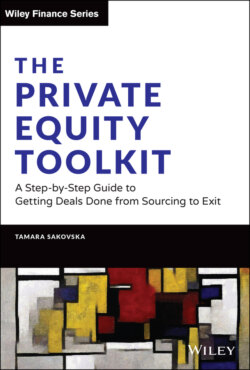Читать книгу The Private Equity Toolkit - Tamara Sakovska - Страница 48
6. Apply creative thinking to supplement your opportunistic deal flow
ОглавлениеWe have already discussed a number of important ways for you to leverage the resources you can access. Now it's time to get creative in your search for opportunistic deals. Thinking outside the box can generate imaginative strategies to enhance your deal flow. Here are a few ideas to help you get started:
Second-order insights from your portfolio companies. Your fund's existing portfolio represents not only a valuable asset base but also a prolific source of new deal ideas. As a private equity owner, your fund has unique access to first-hand intelligence about industries and operating models of your portfolio companies. You can exploit this privileged knowledge by examining each portfolio company's strategic positioning and determining potential winners in its value profit chain. For example, do any of your portfolio companies’ customers or suppliers look attractive as potential standalone investments? What other second-order insights can you derive from information about your portfolio companies?
Second-order insights from recent private equity activity. Learn from your business environment as much as possible and generate your own insights from other people's deals. Look for notable transactions done by your direct competition. Can you apply the same investment thesis to a different sector or a new geography? Can you replicate any transactional breakthroughs, such as an innovative deal structure or a new financing instrument, to generate new investment opportunities in your market?
Second-order effects of M&A transactions. Keep track of the M&A activity that is relevant to your market, including mega-deals involving large diversified conglomerates. Following the initial deal euphoria, the merged entity will take some time to satisfy any antitrust conditions, generate synergies and fulfill, or fail to fulfill, the strategic rationale of the business combination. Watch out for any disposals that might come out of the merged business and could be of interest to your fund as potential investments.
Deal renaissance. This is a fancy expression for revisiting “dead” deals. Are you aware of any recent failed initial public offerings, broken auctions or unsuccessful private placements? Are you reviewing your own deal pipeline regularly to go over any old deals that your fund declined in the last 36 months because the companies were too small or too weak as investment targets? Focus on the most interesting companies on this list and try to think hard about potential ways to improve the investment thesis and turn these companies into compelling deal targets. For example, is it possible to manage investment risks by changing the structure of a transaction? Can you find an experienced manager who can lead and deliver an operational improvement plan at a target company? You might find that some dead deals are not as lifeless as they seem and are worth reviving.
Backing talent in your executive network. Keep in touch with all impressive industry experts, operating executives and CEOs whom you admire for their vision, managerial skills, leadership and insight. There are numerous ways to stay top of mind in the absence of a live transaction, such as exchanging views on a particular sector, organizing thematic events or getting together informally. Make sure the executives in your network are aware of your investment focus and your enthusiasm about working with them on a transaction. You never know, one of them might call you up with a deal idea some day.
Discovering unconventional partners. Are there any family offices, pension funds, sovereign wealth funds, multilateral institutions, fundless sponsors or other investment groups active in your private equity ecosystem? Spend time getting to know these investors and offering your knowledge, network and capital in exchange for access to their deal flow. While it is a less common strategy, consider forming a strategic joint venture with a corporation, either on a particular investment or a thematic strategy. Also, to the extent national or local governments own a stake in an attractive business in the market that you know well, position your fund as a value-added partner with strong functional expertise and explore potential options of working together.
Embracing distress. Does the investment mandate allow your fund to be a white knight who can help out a company during troubled times? If so, you may find it useful to build connections with bank work-out departments, bankruptcy lawyers, restructuring teams at accounting firms and executors of estate assets. Set up alerts to inform you of all business news in your area of focus relating to companies that are reviewing strategic options, appointing administrators, negotiating to restructure or dealing with shareholders in financial trouble.
